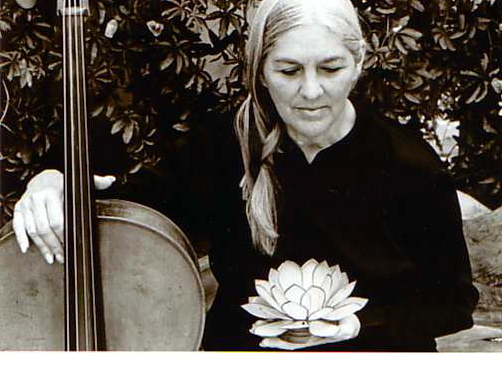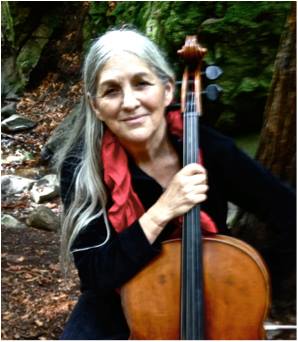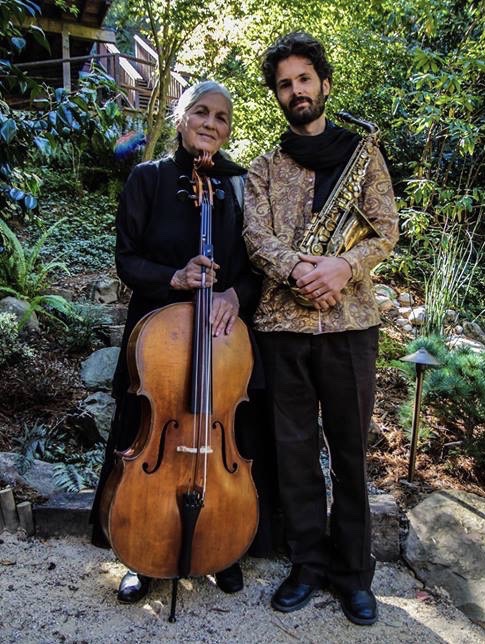
Interview with Suellen Primost—A Cellist and a Sound Healer
20 May 2018 Music
Music, a permutation of sound, is a phenomenon that invariably all of us come in contact in the due course of our lives. More often than not, it intrigues us. Or to put it in better terms, we tend to relate to it. Mystically put, it is believed that we are created out of music—there are as many varieties, genres, and niches of music as we could think of. Interestingly, there’s always something new.
Equally interesting is to know what happens in the minds of people who create music—who sit for hours like budding Mathematicians and learn the art of sonic algebra and train themselves for future calculations. What drives them to pick an instrument or a particular style!
Fascinated by the same idea, we talked to Suellen Primost regarding her life as a musician and sound healer.

Suellen is a seasoned cellist and a sound healer from Oakland, California. She creates and performs music for various shows, concerts, and collaborates with other artists. She was the founder of Symba Center for Multicultural Education and the Arts in Santa Fe, NM. For 10 years, she was the Music Director for Artship Ensemble—an international theatre company based in San Francisco. She has been playing music for over 40 years now.
Below is the email conversation with Suellen regarding her journey and what she seeks in music.
Q1. Tell us about your childhood and how you found your calling for music.
I grew up in a musical family with 4 children. We lived in the USA and moved from New Jersey to South Carolina when I was 6. When not off working, my dad aspired to be a singer like Tony Bennett. My mom, a teacher, also sang and informally played the piano. Both performed from time to time in local community theatre productions where I got my first taste of working in vibrant musical milieus. At 10, I began studying cello at school in a newly formed string program and played in local orchestras until graduation.
Perhaps the most significant moment in my early career as a cellist came when I was 14 and heard the world-class Pittsburgh Symphony perform at a local college. During intermission, I ran backstage and invited anyone in the cello section to come to my house afterwards for tea. The first cellist, a renowned pedagogue named Mihaly Virizlay, accepted, and after the concert, drove back with us to our home. He left his cello in the car, locked securely in our garage, and we all went inside for tea. At some point in the conversation, Mishi (how Mihaly wanted to be called) stood up and left the room. I was mortified. Had my good-humoured dad said something that offended him? 3 minutes later, he returned, cello in hand, and proceeded to play the virtuosic Kodaly “Unaccompanied Cello Sonata.” I sat speechless, simply overcome with awe and emotion. When we dropped Mishi off later at his hotel, I asked him what prompted him to do that…I would never have asked him to play for us… and he replied, “I just wanted to show your father what could become of you.” That was when I knew I had found my calling, when someone of his stature could envision that and had the generosity of spirit to inspire me, a little small-town girl, in the way he did.
Q2. What attracted you to the Cello?
I loved that the cello was shaped like a human body and had a range very similar to the human voice. Also, that it was so soulful. Being a very introspective pre-teen at the time, cello resonated well with me. Also, I had heard Bach “Cello Suites” and loved them.
Q3. How many hours did you practice daily to master the instrument?
I practiced fairly regularly, an hour or two a day, but certainly not with the rigor and strict discipline of a solo concert cellist. The mastery came as I grew, matured as a human being. It went far beyond technique.
Q4. Did you have to sacrifice other activities to give more time to your music and how fulfilling was that?
No, to play cello for me was never a sacrifice. I was not a sporty girl, so I didn’t have to give up sports. I was never a social butterfly, nor was it the age of cell phones and alluring social media, so, in that regard, I could happily give myself to the cello.
Q5. What makes you stick to your music even at the age which feels like post-retirement?
These are, without question, the best years of my life. Post-retirement is a concept I frankly don’t relate to. Retirement from what? Life? Retiring from things I didn’t like to do to things I do like? I have tried always to do things I like, things I love. So, if anything, nothing has changed, really. Now in my vintage years, I am just doing more of the things I love but doing them off the grid. Fortunate for me that I am still in good health, that I am not afflicted with arthritis and can still navigate my instrument with ease. Also, I am not playing the kind of music that requires endless practice and flawless technical prowess. This is a season of sound healing for me. Ambient, improvised music, born of the moment, which is totally different from playing scored music. It involves deep inner listening, holding safe space for others to make a personal journey toward wholeness, clarity, harmony, and peace. It is about honoring silence, working energetically, sensitively, and providing sound bridges for people to return “home.”
Q6. You have been involved in various multidisciplinary collaborations with musicians, poets, dancers, and other creative projects. How unique is that?
For me, it is ALL about collaboration. How unique is that? Not so unique these days. I think more and more artists are collaborating, tapping into the power of synergy, that third force that emerges, far greater than the sum of the individual parts when people come together and unify around a collective intention.

Q7. Share your views about the healing powers of sound and music.
Healing happens when we return “home.” Sound, vibration, music are bridges back “home,” back to Source, back to our essential tuning. They help us reconnect, integrate the scattered parts, embrace pain, heal old wounds, forgive, unlock innate creativity, express love, feed compassion, tap into Great Wisdom, fuel our desire to inspire others and to celebrate our divine nature.
Q8. Personally, what do you seek to accomplish with your music?
My work, musical and otherwise, is to serve as a bridge back to Source…
To support and encourage others along the way.
To inspire others to dwell, as I do, in all possibility.
To encourage others to follow their bliss.
To engender trust in a benevolent universe to bring in all the resources people need to fulfil their dreams, their life’s work. By not always chasing after things, but rather standing in our truths, we are able to attract the people and tribes to which we truly belong.
Q9. What message do you have for our listeners and readers?
I celebrate each of you, walk with you on this great Path, this Red Thread Journey, and pray that your every dream be realized. You are unique. You work is to find what you and only you are called to do and to say, “YES!”
Check this link for Suellen’s Music:
https://www.reverbnation.com/suellenprimost
Email: sprimost@aol.com
Interviewed by,
Vivek Kumar